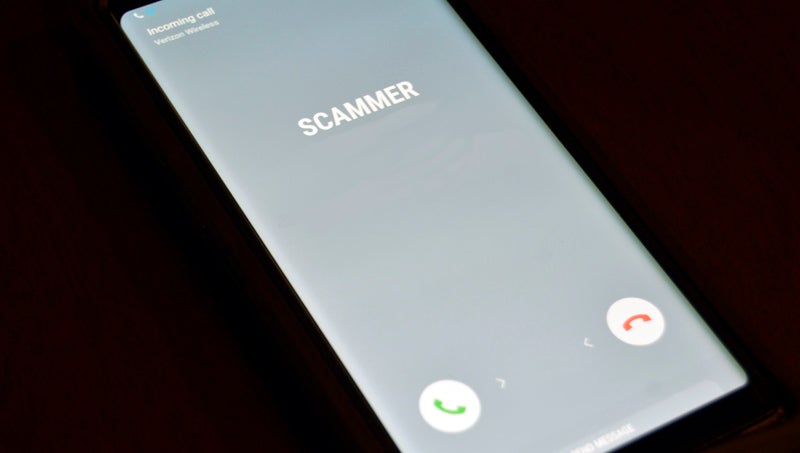Scam calls target senior citizens
Published 11:39 am Monday, December 9, 2019
The Beaufort County Sheriff’s Office and Beaufort County Crime Stoppers are warning local senior citizens to be on the lookout for con artists and scam callers.
In recent months, four different Beaufort County seniors have fallen prey to scam callers, according to the BCSO. Each of the victims receives Social Security checks and all received phone calls from scammers claiming to work for either the Social Security Administration or a bank.
“In two of the calls, the people represented themselves as employees of the Social Security Administration, and in the other two, they represented themselves as bank employees,” BCSO Lt. Jim Vanlandingham said.
The victims were told they had to pay back money to Social Security because they had been overpaid. Each person was given a name and instructed to wire money to that person. Unfortunately, these seniors complied.
“Senior citizens are high-priority scam targets,” Vanlandingham said.
The BCSO reminds the public that the Social Security Administration and banks don’t operate in this manner. Once money is wired, it often ends up overseas or out of state, making recovery almost impossible, and investigating the crime can be a difficult task.
“In a couple of cases, we tracked the money out of state,” Vanlandingham said. “I know one of them; she tracked it to where it was picked up in Texas, but she wasn’t able to get any video of the person who picked it up.”
The best remedy, Vanlandingham says, is taking steps to prevent being scammed in the first place.
“The thing to do is ask a lot of questions,” he said. “If you start asking a lot of questions like their name and what office they work with, for a callback number; if you start asking too many questions, they’re most likely either going to get angry with you or hang up on you.”
In some cases, scammers can use computers to make the number they are calling from appear legitimate, even to the point where the name showing up on the caller ID might read “Social Security” or “IRS.”
“For them, it’s a full time job,” Vanlandingham said. “They’re looking for ways to scam someone out of their money, and if they try 1,000 times and get a few hundred dollars every day, I guess they call it a success.”
To learn more about scams and how to avoid them, visit www.consumer.ftc.gov/articles/0208-phone-scams. If you are contacted by scam callers or fall victim to a scam, report the incident to your local law enforcement agency.
TIPS TO STOP SCAMMERS
The Federal Trade Commission offers the following tips for recognizing scam calls:
Phone scams come in many forms, but they tend to make similar promises and threats, or ask you to pay certain ways. Here’s how to recognize a phone scam.
There is no prize
The caller might say you were “selected” for an offer or that you’ve won a lottery. But if you have to pay to get the prize, it’s not a prize.
You won’t be arrested
Scammers might pretend to be law enforcement or a federal agency. They might say you’ll be arrested, fined or deported if you don’t pay taxes or some other debt right away. The goal is to scare you into paying. But real law enforcement and federal agencies won’t call and threaten you.
You don’t need to decide now
Most legitimate businesses will give you time to think their offer over and get written information about it before asking you to commit. Take your time. Don’t get pressured into making a decision on the spot.
There’s never a good reason to send cash or pay with a gift card
Scammers will often ask you to pay in a way that makes it hard for you to get your money back — by wiring money, putting money on a gift card, prepaid card or cash reload card, or using a money transfer app. Anyone who asks you to pay that way is a scammer.
Government agencies aren’t calling to confirm your sensitive information
It’s never a good idea to give out sensitive information like your Social Security number to someone who calls you unexpectedly, even if they say they’re with the Social Security Administration or IRS.
You shouldn’t be getting all those calls
If a company is selling something, it needs your written permission to call you with a robocall. And if you’re on the National Do Not Call Registry, you shouldn’t get live sales calls from companies you haven’t done business with before. Those calls are illegal. If someone is already breaking the law calling you, there’s a good chance it’s a scam. At the very least, it’s a company you don’t want to do business with.
Further, the FTC offers some easy tips for stopping scam callers:
Hang up
Even if it’s not a scammer calling, if a company is calling you illegally, it’s not a company you want to do business with. When you get a robocall, don’t press any numbers. Instead of letting you speak to a live operator or remove you from their call list, it might lead to more robocalls.
Consider call blocking or call labeling
Scammers can use the internet to make calls from all over the world. They don’t care if you’re on the National Do Not Call Registry. That’s why your best defense against unwanted calls is call blocking. Which type of call-blocking (or call-labeling) technology you use will depend on the phone — whether it’s a mobile phone, a traditional landline or a home phone that makes calls over the internet (VoIP). See what services your phone carrier offers, and look online for expert reviews. For mobile phones, you also can check out the reviews for different call-blocking apps in your online app store.
Don’t trust your caller ID
Scammers can make any name or number show up on your caller ID. That’s called spoofing. So even if it looks like it’s a government agency like the Social Security Administration calling, or like the call is from a local number, it could be a scammer calling from anywhere in the world.
Learn more about unwanted calls and what to do about them at ftc.gov/calls.






